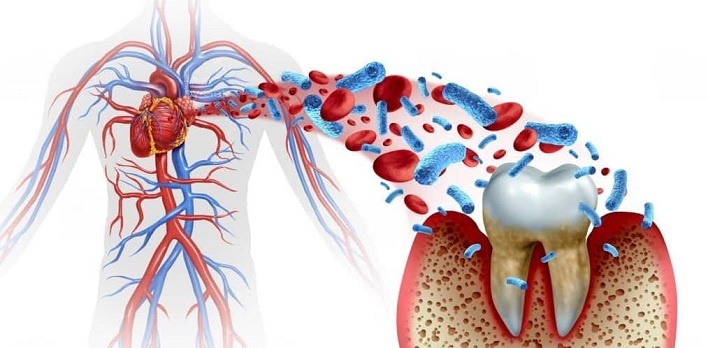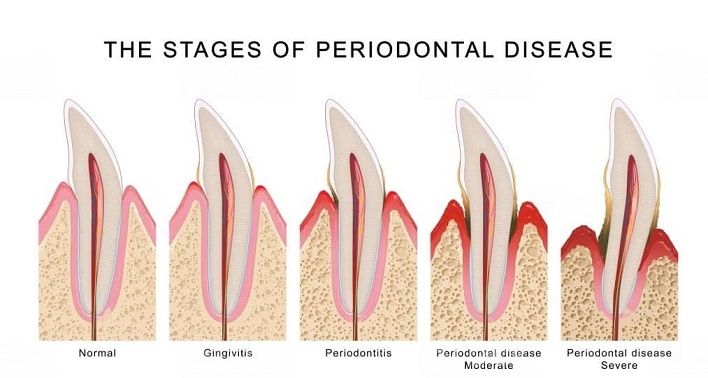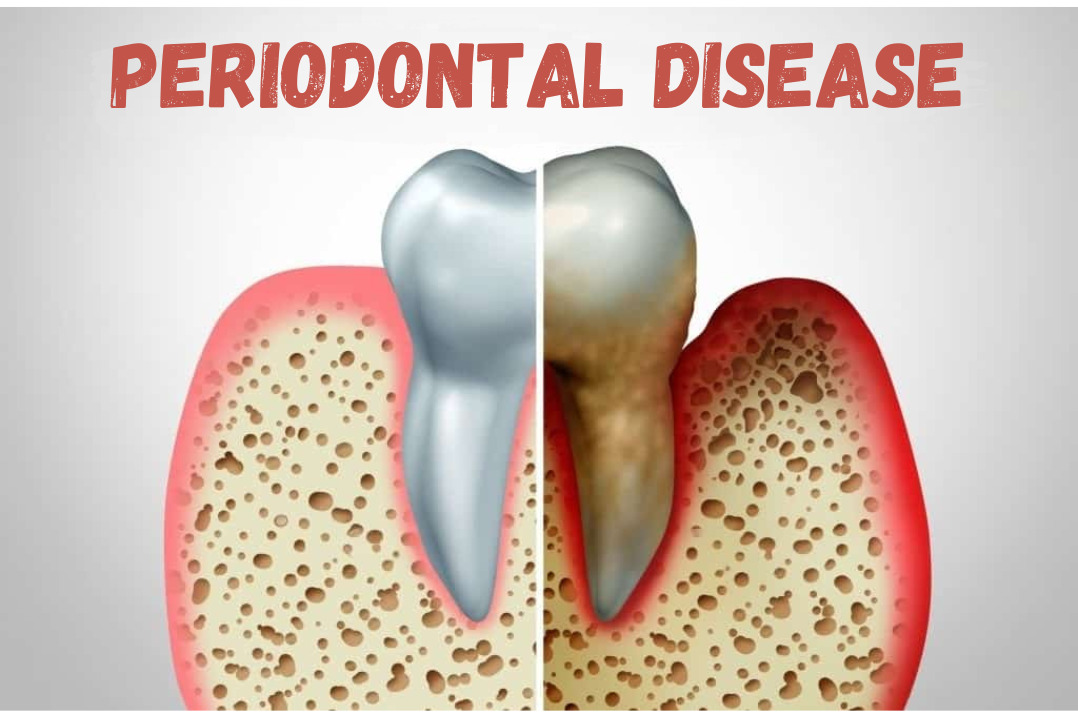Periodontal disease, also known as gum disease, is an infection of the gums and surrounding tissues that support your teeth. It can cause swollen, red, and bleeding gums, and can lead to tooth loss if left untreated. Fortunately, many natural treatments are available to help reverse the effects of periodontal disease.
Periodontal disease, also known as gum disease, is a common oral health condition that affects millions of people worldwide. It occurs when the gums and supporting structures around the teeth become inflamed due to bacterial infection. While professional dental intervention is crucial, there are also natural approaches you can take to help reverse periodontal disease. In this blog post, we will explore effective methods and lifestyle changes that can aid in the natural reversal of periodontal disease. Following these strategies can improve your oral health and prevent further damage.
Periodontal Disease

Before delving into the natural remedies, it’s essential to understand the causes and progression of periodontal disease. Periodontal disease typically starts with the formation of plaque, a sticky film that develops on teeth due to bacteria and food particles. When not removed through proper oral hygiene practices, plaque hardens into tartar, leading to gum inflammation (gingivitis). If left untreated, it can progress to periodontitis, where the infection affects the tissues and bones supporting the teeth, potentially leading to tooth loss. Knowing the stages and symptoms of periodontal disease can help you identify and address the issue in its early stages.
The Role of Oral Hygiene
Maintaining excellent oral hygiene is crucial for reversing and preventing periodontal disease. Here are some key practices to follow:
a. Brushing: Brush your teeth at least twice a day using a soft-bristle toothbrush and fluoride toothpaste. Pay special attention to the gum line and brush gently in circular motions.
b. Flossing: Regular flossing helps remove plaque and debris from between the teeth and along the gum line. Be gentle to avoid damaging the gums.
c. Mouthwash: Rinse your mouth with an antimicrobial mouthwash to kill bacteria and reduce plaque accumulation.
Stages of Periodontal Disease

Periodontal disease progresses through several stages, each characterized by specific symptoms and levels of severity. Here are the four main stages of periodontal disease:
Stage 1:
Gingivitis Gingivitis is the earliest and mildest stage of periodontal disease. It is characterized by inflammation of the gums due to the buildup of plaque bacteria at the gumline. Symptoms of gingivitis may include redness, swelling, and bleeding of the gums, especially during brushing or flossing. However, at this stage, the bone and connective tissues supporting the teeth are not yet affected, and the damage can be reversed with proper treatment and improved oral hygiene.
Stage 2:
Early Periodontitis If left untreated, gingivitis can progress to early periodontitis. In this stage, the infection begins to affect the supporting structures of the teeth. Plaque and tartar continue to accumulate below the gumline, causing the gums to recede and form pockets between the teeth and gums. These pockets allow bacteria to penetrate deeper, leading to further inflammation and damage. Symptoms may include persistent bad breath, increased gum recession, tooth sensitivity, and possible mild bone loss.
Stage 3:
Moderate Periodontitis Moderate periodontitis signifies a more advanced stage of the disease. The gum pockets deepen further, and the bacterial infection spreads, causing increased inflammation, gum recession, and bone loss. Teeth may become loose or shift due to the loss of supporting structures. Additional symptoms may include pus around the teeth, pain while chewing, and increased tooth sensitivity. Professional intervention and comprehensive treatment are necessary to prevent further progression and tooth loss.
Stage 4
Advanced Periodontitis Advanced periodontitis is the most severe stage of periodontal disease. At this point, there is significant destruction of the gums, bone, and connective tissues supporting the teeth. Teeth may become extremely loose or even fall out. The remaining teeth may require extraction if they are beyond salvageable. Advanced periodontitis can also impact overall health, as the chronic inflammation and bacterial presence can contribute to systemic health issues. Treatment at this stage typically involves a combination of dental procedures, such as scaling and root planing, gum surgery, and tooth replacement options like dental implants or dentures.
It’s important to note that periodontal disease is a progressive condition, and early detection and prompt treatment are crucial to prevent further damage. Regular dental check-ups and maintaining good oral hygiene practices can help identify and address periodontal disease in its early stages, increasing the chances of successful treatment and preservation of oral health.
Natural Remedies for Periodontal Disease
Several natural remedies can complement professional dental treatment in reversing periodontal disease. It’s important to note that these remedies should not replace dental care but rather serve as supportive measures. Here are some effective options:
a. Oil Pulling: Swishing a tablespoon of coconut oil or sesame oil in your mouth for 10-15 minutes can help reduce bacteria and plaque accumulation.
b. Saltwater Rinse: Gargling with warm saltwater helps soothe inflamed gums and disinfect the mouth. Dissolve half a teaspoon of salt in warm water and rinse for 30 seconds.
c. Herbal Mouthwashes: Certain herbal mouthwashes, like those containing tea tree oil or echinacea, can offer antimicrobial properties and aid in reducing gum inflammation.
d. Aloe Vera Gel: Applying aloe vera gel directly to the gums can help reduce inflammation and promote healing.
e. Essential Oils: Some essential oils, such as peppermint, clove, and tea tree oil, possess antimicrobial properties. Dilute a few drops in water and use as a mouthwash or apply directly to the affected areas.
Diet and Lifestyle Changes
Making dietary and lifestyle adjustments can significantly contribute to reversing periodontal disease. Here are some recommendations:
a. Nutrient-rich Diet: Consume foods rich in vitamins C and D, antioxidants, and omega-3 fatty acids. These nutrients help support gum health and reduce inflammation. Include foods like citrus fruits, leafy greens, fatty fish, and nuts in your diet.
b. Quit Smoking: Smoking worsens periodontal disease and hinders the healing process. Quitting smoking can significantly improve the condition of your gums.
c. Stress Reduction: Chronic stress weakens the immune system, making it harder for your body to fight off infections. Practice stress management techniques such as meditation, yoga, or regular exercise.
d. Regular Dental Check-ups: Visit your dentist regularly for professional cleanings and to monitor the progress of your periodontal disease.
Conclusion
While reversing periodontal disease naturally is possible, it’s essential to remember that these methods should be used in conjunction with professional dental care. Following a thorough oral hygiene routine, incorporating natural remedies, and making diet and lifestyle changes can support the healing process and improve your oral health. However, it’s crucial to consult with your dentist or periodontist for an accurate diagnosis and personalized treatment plan. By taking a proactive approach and embracing a holistic approach to oral health, you can effectively combat periodontal disease and maintain a healthy smile for years to come.
FAQs
Can natural remedies completely reverse periodontal disease?
While natural remedies can play a supportive role in reversing periodontal disease, they should not replace professional dental treatment. Periodontal disease often requires intervention from a dentist or periodontist to thoroughly clean the teeth and gums, remove tartar, and address any underlying issues. Natural remedies can aid in reducing inflammation, controlling bacteria, and promoting gum health, but they are most effective when used in conjunction with professional care.
How long does it take to see results when using natural remedies?
The timeline for seeing results can vary depending on the severity of the periodontal disease and the consistency of your efforts. Some individuals may notice improvements in their gum health within a few weeks of implementing natural remedies and adopting a comprehensive oral hygiene routine. However, it’s important to remember that reversing periodontal disease takes time, and results may not be immediate. Patience and consistency are key.
Are there any specific foods I should avoid or include in my diet?
A nutrient-rich diet can support gum health and aid in the reversal of periodontal disease. It’s advisable to avoid foods high in sugar and processed carbohydrates, as they can contribute to plaque formation. Instead, focus on consuming foods rich in vitamins C and D, antioxidants, and omega-3 fatty acids. Citrus fruits, leafy greens, fatty fish, nuts, and dairy products are examples of foods that can promote gum health.
Are there any natural remedies that can worsen periodontal disease?
While natural remedies can be beneficial, it’s important to exercise caution and avoid any remedies that could potentially worsen your condition. For example, using abrasive substances like baking soda or aggressive brushing techniques can damage the gums and aggravate periodontal disease. It’s best to consult with your dentist or periodontist before trying any new remedies to ensure they are safe and suitable for your specific situation.
Can stress impact periodontal disease?
Stress can have a negative impact on overall oral health, including periodontal disease. Chronic stress weakens the immune system, making it harder for the body to fight off infections, including gum infections. Additionally, stress can lead to unhealthy coping mechanisms like smoking or poor dietary choices, which can further exacerbate periodontal disease. Incorporating stress reduction techniques, such as meditation, exercise, and self-care, can help support gum health and overall well-being.

